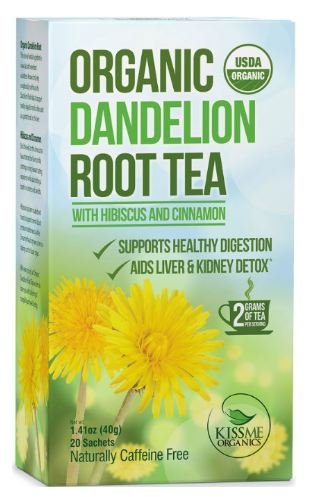Dandelion tea has been gaining popularity these days, not only for its unique taste but also for the range of health benefits it provides. From promoting liver detoxification to aiding digestion, dandelion tea is a natural elixir that can do wonders for your health. So, let’s explore the amazing benefits of dandelion tea that you never knew about!
Natural diuretic and liver tonic
Dandelion tea is a natural diuretic that can increase urine output, attract toxins, and cleanse the liver. Drinking two cups of dandelion tea can improve urine production, which aids in detoxification of the body.
The plant’s root has been traditionally used in folk medicine as a liver tonic due to its ability to increase flow of bile, thus helping in liver detoxification. Naturopaths believe that regular use of dandelion root tea can help soothe minor digestive issues, relieve symptoms of liver disease, and aid in weight loss.
It is recommended that dandelion tea be consumed regularly to take advantage of its benefits. However, people taking prescription medications must consult with their doctors before consuming dandelion tea due to possible drug interactions.
Potential detoxifying effects
Dandelion tea has been used for centuries as a folk remedy for various ailments. Recent studies suggest that it may have potential detoxifying effects on the body, particularly on the liver.
This is due to the ability of dandelion root to increase bile flow and assist in the removal of harmful toxins from the body. The tea may also act as a diuretic, increasing urine output and aiding in the elimination of toxins through the urinary system.
In addition to these potential benefits, dandelion tea is also believed to have anti-inflammatory and antioxidant properties through the presence of taraxasterol and Vitamin C. This makes it a useful supplement for those looking to support their overall health and wellbeing.
However, it’s important to note that some individuals may have allergies or medical conditions that make consuming dandelion tea unsafe. It’s always best to consult with a healthcare professional before adding any new supplements or remedies to your routine.
Could aid in weight loss
Dandelion tea has many benefits and could aid in weight loss. It is low in calories and packed with nutrients, making it a great drink for those on a diet. The potassium in dandelion acts as a diuretic, increasing daily urine output and reducing water weight.
Drinking dandelion tea could also improve endurance, making physical activities easier and promoting fat loss. Additionally, dandelion tea may have similar effects on the body as weight loss drug Orlistat, helping to reduce belly fat.
Beyond weight loss benefits, dandelion tea has many beneficial effects on digestive health and promotes liver function. However, it is important to check with a healthcare provider before consuming dandelion tea, as it may trigger allergic reactions in some people and can interact with certain medications.
May have anti-cancer properties
Dandelion tea has been shown to have potential anti-cancer properties. Studies have found that dandelion root extract (DRE) can affect the proliferation and survival of colorectal cancer cells through the activation of multiple death signaling pathways. Aqueous DRE was found to induce programmed cell death (PCD) selectively in over 95% of colon cancer cells.
Furthermore, oral administration of DRE helped retard the growth of human colon xenograft models by over 90%. The phytochemical analyses of the extract showed a complex multi-component composition of the DRE, suggesting that it can target multiple vulnerabilities of cancer cells without any toxicity to non-cancer cells.
The potential of DRE as a non-toxic and effective alternative to reduce the occurrence of cancer cells drug-resistance is promising, especially given the rise in cancer cases worldwide and the limitations of current chemotherapy and chemopreventive approaches.
Can help with urinary tract infections
Dandelion tea has various benefits that can positively affect one’s health. One of these benefits is that it can help with urinary tract infections. Research suggests that dandelion tea acts as a diuretic and increases urine output. In a study, participants showed an increased urine output after consuming two 1-cup servings of dandelion tea made from the leaves of the plant. Additionally, the polysaccharides found in dandelion may aid in treating urinary tract infections.
Dandelion root tea has also been historically used as a liver tonic and recent studies suggest that it aids in detoxifying the liver, helping with liver disease, and improving liver function. However, individuals who are currently taking certain medications should consult with their physician before consuming dandelion tea.
Contains antioxidants for overall health

Dandelion tea is not just a common yellow flower found in meadows but is also an ancient herbal medicine with various health benefits. This tisane is often made from the dandelion root, but the stem, leaves, and the whole plant can also be brewed to create a lighter floral palate. It is an excellent coffee substitute for those who can’t handle caffeine.
The dark coloring and deep and smoky-tasting notes of the dandelion root are comparative to coffee. Pre-picked dried and bagged dandelion tea can also be bought to avoid the potential pitfalls of picking up pesticides while gathering dandelion plants.
Drinking dandelion tea can help the body detox, reduce bloating, and cut out UTI’s. It also helps in helping moderate blood sugar levels and improve insulin tolerance, which is beneficial for those with diabetes type 2. Dandelion tea is a rich source of antioxidants, which neutralize free radicals that can cause aging and diseases such as cancer. It can cleanse and maintain good liver health, an essential organ for filtering and detoxifying the blood. Additionally, it may also help reduce hyperlipidemia, which is the term used for high cholesterol levels in the blood, and potentially assist in weight loss.
Dandelion tea is filled with vitamins, minerals, and flavonoids that can be advantageous for overall health. It is an excellent source of Vitamin A and potassium. The presence of Vitamin C in dandelion tea may also account for its effectiveness against seasonal colds. Taraxasterol, a compound found in dandelion, has significant antioxidant properties that help combat inflammation and regulate white blood cells, which keep them from triggering inflammation unnecessarily. Polysaccharides in dandelion reduce liver stress, produce bile, and filter out potentially harmful chemicals.
Before consuming dandelion tea, consult with a doctor, as it may interfere with the action of certain medications. Dandelion tea should be avoided if one has allergies, pregnant, breast-feeding, taking diuretics, or antibiotics. It should be consumed with caution if one has liver or kidney issues or is taking medication for blood flow and clotting. Despite its potential health benefits, dandelion tea should be consumed cautiously and as advised by a doctor.
Supports healthy liver function
Dandelion tea has been used for centuries in folk medicine as a liver tonic, and recent scientific studies suggest that dandelion root may indeed help protect the liver against disease and support overall liver function.
The tea acts as a natural diuretic, increasing urine output, which can help reduce water weight and relieve bloating. While more research is needed to fully support claims that dandelion tea reduces bloating, there is evidence of increased urine output among participants after consuming one cup of dandelion tea.
Dandelion also contains antioxidants such as vitamin A and phenolic compounds, which act as free radical scavengers, reducing oxidative stress on the body and lowering the risk of chronic diseases such as cancer. Moreover, preliminary studies suggest that dandelion roots and leaves, when paired with another herb uva ursi, may help reduce urinary tract infections.
Dandelion tea is considered safe for most people, but those with ragweed allergies should avoid it. It can also interact with certain medications, so it’s best to consult a doctor before drinking it.
May help lower cholesterol levels

Dandelion tea has been found to have numerous health benefits, including its potential to help lower cholesterol levels.
According to research, dandelion greens and roots have properties that can decrease the accumulation of triglycerides and cholesterol in fat cells. Consuming 1% of dandelion root or leaf as a part of a high-cholesterol diet has been shown to positively change lipid profiles and plasma antioxidant enzyme activities in rabbits.
Moreover, dandelion is rich in antioxidants that help neutralize free radicals in the body, which are molecules that contribute to chronic disease risk if their levels get too high. Its antioxidant content, including beta carotene and polyphenol compounds, may neutralize harmful free radicals and protect against chronic disease.
By lowering cholesterol levels and preventing oxidative stress, dandelion tea may ultimately reduce the risk of atherosclerosis and other cardiovascular diseases. While more research is needed to establish its efficacy in humans, regular consumption of dandelion tea seems to be a promising option for individuals struggling with high cholesterol levels.
Potential aid for diabetes management
Dandelion tea has been found to have potential benefits for those looking to manage their diabetes. This tea contains bioactive chemical components like chicoric acid, taraxasterol, chlorogenic acid, and sesquiterpene lactones that have shown anti-diabetic properties.
Dandelion, a genus from the Asteraceae family, is easily available in several areas worldwide and is used as food and therapeutics in many countries, including for the control and treatment of type 2 diabetes. The anti-diabetic properties of dandelion are attributed to its bioactive chemical components that lower blood sugar levels, stimulate insulin secretion from the pancreas, and inhibit alpha-glucosidase.
Although initial research appears promising, further studies are required on the active components’ impact on cellular behavior to gain a better understanding of the pharmacological, physiological, and biochemical mechanisms of dandelion-derived compounds on T2D.
Easy to find and make at home
Dandelion tea has gained popularity as a health-supporting drink with plenty of benefits. This herbal tea can be made from the plant’s roots, flowers, and leaves, making it versatile to use. Dandelions are packed with nutrients and medicinal compounds that can positively impact numerous health conditions.
Drinking dandelion tea is one of the easiest ways to incorporate plant-based medicine into your daily routine. Dandelions are easy to forage, and you can make tea from various parts of the plant. For example, roasted dandelion root has a coffee-like flavor and is a popular substitute for coffee.
Dandelion tea offers benefits based on which part of the plant you use. All parts of the dandelion plant contain an array of compounds, including inulin, a prebiotic that supports gut health. The leaves contain vitamins and minerals, including lutein, which can help alleviate headaches and menstrual cramps. The root, on the other hand, supports liver health and can address issues related to metabolism and hormone balance.
Studies suggest that dandelion tea may provide relief by acting as a natural diuretic and increasing urine output. In addition, dandelion root tea is known to support overall liver health and detoxify the liver. It also has anti-inflammatory properties that can aid in alleviating the symptoms of liver disease. Dandelion tea may also have possible anti-obesity and cancer-fighting effects, although more research is necessary.
Overall, dandelion tea is safe and easy to find or make at home. However, it’s important to note that some people may have an allergy to dandelion, and it can interact with certain medications. Therefore, it’s wise to speak to your healthcare provider before consuming dandelion tea if you’re on any medication or have any underlying medical conditions.
About the Author
Reyus Mammadli is the author of this health blog since 2008. With a background in medical and biotechnical devices, he has over 15 years of experience working with medical literature and expert guidelines from WHO, CDC, Mayo Clinic, and others. His goal is to present clear, accurate health information for everyday readers — not as a substitute for medical advice.







